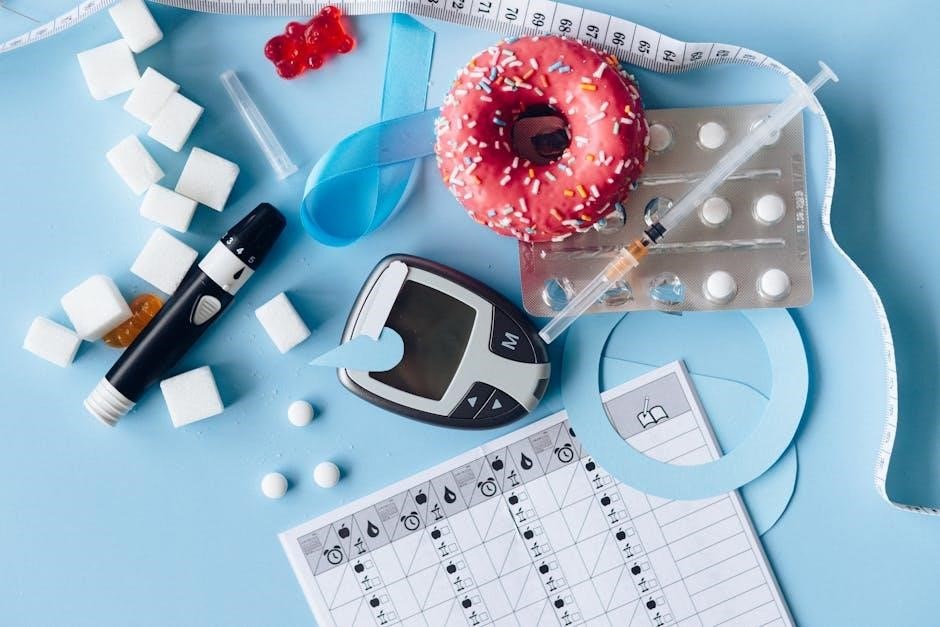
Diet plays a crucial role in managing dialysis, helping control waste products and fluid balance. A well-planned diet, guided by a renal dietitian, ensures proper nutrient intake while adhering to necessary restrictions.
1.1 The Role of Diet in Managing Dialysis
Diet plays a vital role in managing dialysis by controlling waste buildup and fluid balance. A well-planned diet helps maintain proper nutrient levels, preventing complications. It supports dialysis efficiency by limiting harmful substances and ensuring the body functions optimally. A renal dietitian tailors meal plans to individual needs, aiding in overall health management and improving treatment effectiveness.
1.2 Importance of Nutritional Compliance
Nutritional compliance is essential for dialysis patients to manage waste buildup, maintain fluid balance, and prevent complications. Adhering to dietary guidelines helps control blood levels of sodium, potassium, and phosphorus, reducing the risk of cardiovascular and bone-related issues. Proper nutrition also improves treatment outcomes and overall quality of life, making it critical for long-term health management.

Key Nutritional Elements in a Dialysis Diet
A dialysis diet focuses on managing protein, calories, sodium, potassium, phosphorus, and fluids. These elements help maintain energy, prevent complications, and support overall health effectively.
2.1 Protein and Caloric Intake
Protein and caloric intake are vital for maintaining energy and muscle mass in dialysis patients. High-quality protein sources, like lean meats and fish, are recommended to support muscle health. Adequate calories prevent weight loss and ensure proper bodily functions. Balancing protein and calories is essential, and a renal dietitian can help tailor intake to individual needs for optimal health outcomes.
2.2 Sodium, Potassium, and Phosphorus Restrictions
Dialysis patients must limit sodium, potassium, and phosphorus due to reduced kidney function. High sodium can increase fluid retention, while excess potassium and phosphorus lead to serious health risks. Foods like processed meats, dairy, and certain fruits are restricted. Reading labels and avoiding additives with these minerals helps maintain safe levels, protecting overall health and preventing complications.
2.3 Fluid Management
Fluid management is critical for dialysis patients, as excess fluid can lead to weight gain and complications like hypertension. Patients should track daily intake, avoid salty foods that increase thirst, and monitor weight between sessions. Limiting fluids to prescribed amounts ensures safe levels and supports effective dialysis treatment, preventing fluid-related health issues.

Managing Blood Waste Products Through Diet
Dietary adjustments help manage blood waste buildup by limiting foods that produce excess toxins. Reducing high-protein and high-sodium intake can minimize uremic toxins, supporting kidney function and overall health.
3.1 Reducing Uremic Toxins
Limiting dietary protein and sodium helps reduce uremic toxins, which accumulate when kidneys fail. Eating lean proteins like fish and poultry, and avoiding processed foods, can lower toxin levels. Additionally, staying hydrated within fluid limits aids in flushing out waste, though excessive fluid can strain the body between dialysis sessions.
3.2 Avoiding Foods High in Potassium and Phosphorus
Dialysis patients must limit foods rich in potassium and phosphorus to prevent buildup in the blood. Avoid bananas, oranges, spinach, and dairy products. Opt for low-potassium alternatives like apples and green beans. Phosphorus is often hidden in processed foods, so always check labels. Balancing these minerals helps maintain healthy blood levels and reduces strain on the body during dialysis sessions.

Foods to Avoid for Dialysis Patients
Dialysis patients should avoid foods high in sodium, potassium, and phosphorus. Limit processed meats, canned soups, dairy products, and foods with potassium additives. Avoid liver and starfruit.
4.1 High-Sodium and High-Fat Foods
Dialysis patients should limit high-sodium foods like processed meats, canned soups, and condiments, as they can worsen fluid retention. High-fat foods, such as fried items and greasy snacks, should also be avoided to protect heart and kidney health. Opt for low-sodium alternatives and use herbs for seasoning to enhance flavor without added salt.
4.2 Foods with Potassium Additives
Foods containing potassium additives, such as certain processed or packaged items, should be avoided by dialysis patients. These additives can increase potassium levels, posing health risks. Always check ingredient lists for the word “potassium” and opt for fresh, unprocessed foods to maintain safe potassium levels and overall health.

Importance of Fluid Restriction
Fluid restriction is essential for dialysis patients to prevent weight gain and maintain proper fluid balance, ensuring effective dialysis and overall health stability between sessions.
5.1 Managing Weight Gain Between Dialysis Sessions
Fluid restriction helps control weight gain between dialysis sessions. Monitoring daily fluid intake and avoiding high-sodium foods reduces bloating. A renal dietitian can guide personalized strategies to maintain optimal fluid balance and overall health.
5.2 Tips for Reducing Fluid Intake
To reduce fluid intake, weigh yourself daily and note changes. Avoid salty foods that increase thirst and drink fluids only when thirsty. Use herbs and spices for flavor instead of salt. Track fluid consumption with a diary and opt for water or low-sodium beverages. Limit ice cubes and fluid-rich foods like watermelon and cucumbers.
Role of a Renal Dietitian
A renal dietitian specializes in creating personalized meal plans for dialysis patients, ensuring proper nutrient intake while managing waste products and fluid balance through dietary adjustments.
6.1 Personalized Meal Planning
A renal dietitian creates tailored meal plans based on individual needs, considering factors like weight, kidney function, and lab results. These plans help manage waste products, balance fluids, and ensure adequate protein and calorie intake. Personalized nutrition supports overall health and well-being for dialysis patients, making meals enjoyable while adhering to dietary restrictions.
6.2 Monitoring Blood Levels and Adjusting the Diet
Regular blood tests track key nutrients and waste products, guiding dietary adjustments. A dietitian reviews these results to modify protein, sodium, potassium, and phosphorus intake. This ensures the diet remains effective, preventing complications like fluid overload or electrolyte imbalances. Continuous monitoring and adjustments help maintain optimal health for dialysis patients, adapting to their changing needs over time.
Sample Meal Plans for Dialysis Patients
Meal plans include balanced options like oatmeal for breakfast, grilled chicken with low-potassium vegetables for lunch, and baked fish for dinner, ensuring low sodium and potassium intake.
7.1 Breakfast, Lunch, and Dinner Ideas
Start with breakfast options like oatmeal or scrambled eggs with low-sodium cheese; For lunch, consider grilled chicken with low-potassium vegetables. Dinner ideas include baked fish with quinoa and steamed greens. Avoid high-sodium, potassium, and phosphorus foods, focusing on balanced, nutrient-rich meals tailored to dialysis needs.
7.2 Snack Options
Healthy snacks for dialysis patients include fresh fruits like apples or berries (low in potassium), small portions of nuts or seeds, and lean proteins like hard-boiled eggs. Opt for low-sodium crackers or rice cakes. Avoid processed snacks with hidden potassium or sodium additives. Always check food labels and practice portion control to maintain dietary balance and compliance.
Exercise and Activity Levels
Regular physical activity enhances waste removal and improves overall health. Exercise helps maintain muscle strength, supports cardiovascular health, and boosts energy levels in dialysis patients.
8.1 Daily Physical Activity Recommendations
Regular physical activity, such as walking or light exercises, is recommended daily to improve circulation and muscle strength. Dialysis patients should aim for at least 30 minutes of moderate exercise most days of the week. Activities like yoga or swimming are also beneficial, helping to maintain flexibility and overall well-being while supporting waste management.
8.2 Exercise Benefits for Waste Management
Exercise enhances blood circulation, promoting efficient waste removal during dialysis. Regular activity strengthens muscles and improves the body’s natural filtration processes, aiding in toxin elimination. Physical activity also boosts overall well-being, contributing to better management of waste products and supporting kidney function.

Monitoring and Adjusting the Diet
Regular blood tests help track nutrient levels and waste products, enabling adjustments to the diet. A renal dietitian reviews lab results to tailor meal plans, ensuring optimal health and waste management.
9;1 Regular Blood Tests
Regular blood tests are essential for monitoring nutrient levels, waste products, and overall health in dialysis patients. These tests measure potassium, phosphorus, urea, and creatinine levels, helping identify imbalances. Based on blood test results, the dietitian can adjust the diet to maintain optimal levels, ensuring the effectiveness of dialysis and preventing complications. This routine monitoring supports long-term health management.
9.2 Adjusting the Diet Based on Lab Results
Lab results guide dietary adjustments to maintain optimal nutrient levels. High potassium or phosphorus levels may require limiting certain foods, while low albumin levels might increase protein recommendations. A renal dietitian reviews bloodwork to tailor the meal plan, ensuring it aligns with current health needs and prevents complications. This personalized approach supports better waste management and overall well-being.

Complications of Poor Dietary Compliance
Poor dietary compliance can lead to cardiovascular issues, bone disease, and fluid imbalances. It may worsen kidney function and overall health, reducing quality of life and longevity.
10.1 Cardiovascular and Bone-Related Issues
Poor dietary compliance increases the risk of cardiovascular diseases due to high sodium and fluid intake, which can lead to hypertension and heart strain. Additionally, excessive potassium and phosphorus consumption can cause mineral imbalances, potentially leading to hyperphosphatemia and hyperkalemia. These conditions are linked to bone diseases like renal osteodystrophy, where bones become weak and brittle due to disrupted mineral metabolism.
A renal dietitian plays a key role in preventing these complications by tailoring dietary plans to manage mineral levels and reduce cardiovascular risks, ensuring overall health and well-being for dialysis patients.
10.2 Impact on Overall Health
Poor dietary compliance can lead to a weakened immune system, increased fatigue, and a higher risk of infections. It may also cause digestive issues and slow recovery, affecting overall well-being. Proper nutrition is essential to maintain energy levels and support the body’s ability to function effectively, ensuring better health outcomes for dialysis patients.
Adhering to a renal diet is crucial for effective dialysis management, ensuring proper waste removal, optimal fluid balance, and overall well-being, which helps prevent complications.
11.1 Importance of Adherence to Dietary Guidelines
Adhering to dietary guidelines is vital for managing dialysis effectively, preventing complications, and maintaining overall health. Proper diet helps control waste buildup, fluid balance, and electrolyte levels, ensuring better treatment outcomes and quality of life for dialysis patients.
11.2 Long-Term Benefits of a Renal Diet
A renal diet offers long-term benefits, including reduced risk of complications like cardiovascular issues and bone disease. It helps maintain stable electrolyte levels, promotes better blood chemistry, and supports overall health. Consistent adherence can improve energy levels, reduce hospitalizations, and enhance quality of life for dialysis patients, making it a cornerstone of long-term care and well-being.